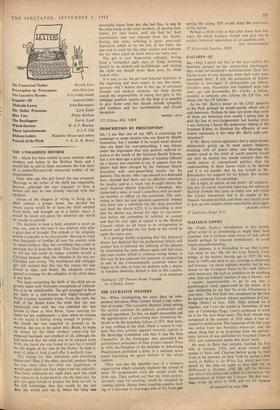THE LUCRATIVE MYSTERY
SIR,—When investigating the early days on inde- pendent television, Peter Forster found a ripe collec- tion of ironies. 'The Lucrative Mystery' listed among the curious contrasts the political, professional and clerical opposition. To this, we might reasonably add the apprehension of advertising men. Commonly be- lieved to be the founding fathers of ITV, they were, in fact, nothing of the kind. There is reason to sup- pose that they actively opposed minority reports to the Beveridge Committee and that it was the then Chancellor of the Exchequer who persuaded the professional persuaders of their proper interest. Even in 1954, the President of the Institute of Advertising Practitioners published a letter in a national news- paper expressing his grave distrust of the whole venture.
There was also the splendid case of a women's organisation which solemnly deplored the arrival of more TV programmes since this would arrest the birth rate. They worked out that the front parlour, normally used for courting, would be occupied by viewing addicts. Hence fewer courting couples, lead- ing to a decrease in marriages and so far from per- verting the young, ITV would delay the pulse-beat of the nation.
Perhaps a third irony is that after fewer than five years, the whole bonanza should now give rise to earnest, historical speculation of an academic sort.
ERIC GOLDSCIIMIDT
57 Netherhall Gardens, NIV3


































 Previous page
Previous page